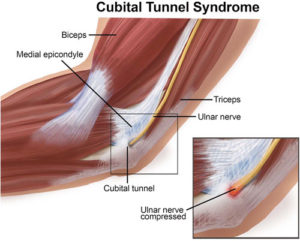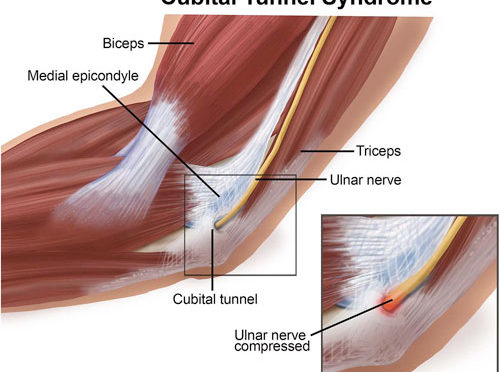 People often refer to any hand and wrist ailment as carpal tunnel syndrome, but ulnar tunnel syndrome (also called cubital tunnel syndrome) affects a specific part of the hand. Symptoms include numbness and tingling in the fifth digit (pinky finger) and half of the ring finger.
People often refer to any hand and wrist ailment as carpal tunnel syndrome, but ulnar tunnel syndrome (also called cubital tunnel syndrome) affects a specific part of the hand. Symptoms include numbness and tingling in the fifth digit (pinky finger) and half of the ring finger.
Musicians recognize the symptoms—numbness and tingling in the hand and fingers. Compression of the nerve commonly occurs behind the inside part of the elbow. Left untreated the strain can develop into weakness and acute pain in the fingers, which can extend to the elbow.
Unlike carpal tunnel, symptoms related to cubital tunnel syndrome can be better managed with conservative treatment, such as modifying activity level and using a brace. In rare cases, if the nerve compression is causing muscle weakness or severe pain in the hand, surgical intervention may be necessary.
The ulnar is the largest unprotected nerve in the body, which has very little soft tissue and muscle to protect it. Each time a musician bends his or her elbow, the ulnar nerve is slightly compressed. Sustaining a position for several hours a day can wreak havoc on this sensitive nerve. Most musicians need to bend their elbows to 90 degrees to simply hold their instruments. Add to that, normal activities like driving, computer use, and exercise and the pressure quickly multiplies. Oboists and bassoonists who make reeds add yet another occupational hazard by using and bending their elbows for even longer stretches.
Numbness commonly occurs at night and is related to the position of the arm. Sleeping with the elbow flexed will raise the pressure in the cubital tunnel three times more than normal. Sleeping with hands behind the head will raise the pressure seven times more than normal.
Guitarists typically have ulnar tunnel issues in their fretting arm and hand. The bent elbow and arched wrist actually stretches the nerve, and repetitive movement of the fretting hand fingers can cause irritation. Ulnar tunnel issues can sometimes be treated through stretching. You may also need to take a break from playing to allow the body to heal.
Tips to Relieve Pain and Pressure
- Straightening the arm at night will relieve numbness, and sleeping with the arm out straight may avoid hand numbness at night.
- Practice good posture and ergonomics. Keep your shoulders back and head up while playing your instrument or using a computer.
- Before playing, warm up properly with a stretching regimen.
- Wear gloves during cold weather to protect your hands.
- Avoid awkward positions, like resting your arm on the car window while driving.
- Drink plenty of water to ensure that your joints and ligaments stay lubricated.
- Wash your hands in warm water to loosen up before playing.
- Take frequent rest breaks from any repetitive tasks.
If you ever feel pain or numbness while playing or performing any activity, stop! Always seek immediate medical advice for pain or injury.


